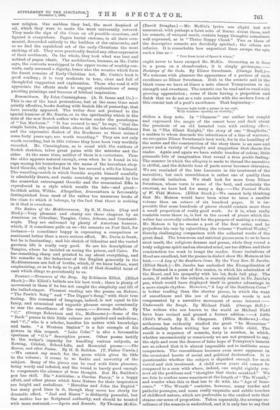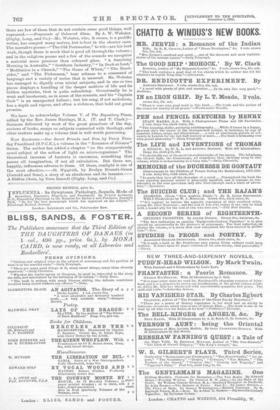POBTRY.—Treasures of the Deep. By Robinson Elliot. (Elliot Stock.)—Mr. Elliot's
ballads are his best work ; there is plenty of movement in them if he has not caught the simplicity and lilt of the ballad-singer. Pleasant reading are the poems on Nature, "The Pewit's Song" and "The Dipper's Song," with their true feeling. His command of language, indeed, is not equal to his fancy, and unmusical and unpoetic phrases escape occasionally to mar the smoothness of the verses.—Batevon Ballads. By " C." (George Robertson and Co., Melbourne.)—Some of the " Bush " poems in this little volume are spirited and melodious ; and " C.," who is a scholar, handles his metres with knowledge and taste. " A Western Station" is a fair example of his powers in this respect. " Lake Colac " is also a favourable specimen of " C.'s " descriptive power. Other poems testify to the writer's capacity for handling various subjects, as Rowing, Cricket, School-Life, and Memorial poems.—The Rescue, and other Poems. By H. B. Bandon. (T. Fisher Unwin.) —We cannot say much for the poem which gives its title to the volume ; it seems to us feeble and unworthy of the subject. Many of the pieces can be read with little pleasure, being wordy and inflated, and the sound is barely good enough to compensate the absence of true thought. But Mr. Baildon's pen has skill. His " Auriculas : a Garden Fancy," is a happy effort, and other pieces which have Nature for their inspiration are bright and melodious. " Herodias and John the Baptist" has many good lines in it, though they move too slowly for dramatic effect. " Jael and Sisera" is distinctly powerful, but the motive has no Scriptural authority, and should be treated with more restraint.--Lyrics and Sonnets. By Thomas McKie. (David Douglas.) — Mr. McKie's lyrics are slight but not unmusical, with perhaps a faint echo of Burns about them, and his sonnets, of unequal merit, contain happy thoughts sometimes well expressed, as in "Thrice Happy Cloud." Two or three of the descriptive sonnets are decidedly spirited ; the others are inferior. It is remarkable how unpoetical lines escape the eye, such a line as—
Free from taint of fipani,h wines,"
ought never to have escaped Mr. McKie. Occurring as it does in a poem on a stonebreaker, it is simply grotesque.---- Footsteps of the Gods. By Elinor Sweetman, (George Bell.)— We welcome with pleasure the appearance of a poetess of such excellence as Elinor Sweetman. Both in the sonnets and in the blank verse we have at times a note almost Tennysonian in its strength and sweetness. The sonnets can be read and reread with growing appreciation ; some of them having a proportion and finish that we do not as a rule associate with the modern form of this crucial test of a poet's excellence. That beginning- " Sorrow hath built a palace in my soul, With windows opening on eternity," strikes a deep note. In " Glamour" our author has caught and expressed the magic of the sunset hour and dusk about the precincts of an old haunted ruin with striking effect. But in "The Silent Knight," the story of one " Sitnplioita," a maiden to whom descends the inheritance of a line of warriors, we recognise Elinor Sweetman's best work, for in the handling of the metre and the construction of the story there is an ease and power and a variety of thought and suggestion that charm the reader. Again and again we have subtle touches of colour, little prismatic bits of imagination that reveal a true poetic feeling. The manner in which the allegory is made to thread the narrative is skilful, and the didactic tone of parts never becomes obtrusive. We are reminded of the late Laureate in the treatment of the narrative; but such resemblance is rather one of quality than any slavish imitation. 'We shall look for more from Elinor Sweetman, whose verse is some of the best, and certainly the sweetest, we have had for many a day.—The Poetical Works of W. Tidd Matson. (Elliot Stock.)—We cannot help thinking that Mr. Matson would have been wiser to issue a smaller volume than an octavo of six hundred pages. It is im- possible that some hundreds of pieces should contain more than a small proportion of really good work. As it is, what really readable verse there is, is lost in the crowd of pieces which the writer has avowedly collected for the purpose of making a volume, Mr. Matson is by no means a poet of the first order, and he prejudices his case by subscribing the volume "Poetical Works," thereby challenging comparison with the collected works of the great dead. The humorous and satirical pieces seem to us to have most merit, the religious dramas and poems, while they reveal a truly religious spirit and an elevated mind, are too diffuse and their construction too weak to tempt the reader. Some imitations of Hood are excellent, but the poems in dialect show Mr. Matson at hie best.—A Lay of the Southern Cross. By the Very Rev. H. Jacobs. (Elliot Stock.) —Dr. Jacobs has embodied the Evangelisation of New Zealand in a poem of five cantos, in which his admiration of the Maori, and his sympathy with his lot, finds full play. The metre, if suited to the subject, is scarcely suited to Dr. Jacobs's pen, which would have displayed itself to greater advantage in a more simple rhythm. However," I Lay of the Southern Cross " is better reading than the shorter pieces, in which the want of smoothness and the use of too elaborate words is not compensated by a narrative movement of some interest.— Underneath the Bough. By Michael Field. (George Bell.)— The writers who are known to the world as Michael Field have here revised and pruned a former edition. --A Little Child's Wreath. By E. R. Chapman. (Elkin Mathews.)—Our authoress has evidently studied the great " In Memoriam " affectionately before writing her own to a little child. The result is a sequence of sonnets, forty in number, in which, whether unconsciously or consciously we are not prepared to say, the style and even the dreams of false hope of Tennyson's lament are so echoed that it is almost impossible not to institute some comparison. The resemblance becomes even more apparent in the occasional bursts of social and political declamation. It is questionable whether the subject is dignified enough for such varied and rich treatment. A child seven years old cannot be compared to a man with whom, indeed, one might rightly con- nect all the problems and " thoughts that shake mankind." We are fain to confess some weariness at the length of " The Wreath," and wonder what this or that has to do with the " Age of Inno- cence." "The Wreath" contains, however, many tender and pathetic passages, and some really exquisite and subtle touches of childhood nature, which are preferable to the exalted note that strains our sense of proportion. Taken separately, the average ex- cellence of the sonnets! is undoubted, and it is only fair to say that there are few of them that do not contain some good things, well expressed.—Fragments of Coloured Glass. By A. W. Webster. (Digby, Long, and Co.)—Mr. Webster, who, it seems, is a prolific writer, has essayed many metres, but is best in the shorter ones. The narrative poems—" The Old Postmaster," to wit—are his best work, though there is much that is good all through the volume ; and in the religious poems and a few of the sonnets we recognise a material more precious than coloured glass. " A Sunshiny Morning in Australia," " Southern Industry," " In Dock at Last," " Meditation in a Church," "The Game of Whist," " The Stock- rider," and "The Fisherman," bear witness to a command of language and a variety of metre that is unusual. Mr. Webster has managed to dignify even trivial subjects, and in one or two pieces displays a handling of the deeper motives of life and its hidden mysteries, that is quite refreshing. Occasionally he is weak and incoherent, as in some of the sonnets, and his "Captain Cook " is an unexpected failure ; but his song, if not melodious, has a depth and vigour, and often a richness, that hold out great promise.



















































 Previous page
Previous page